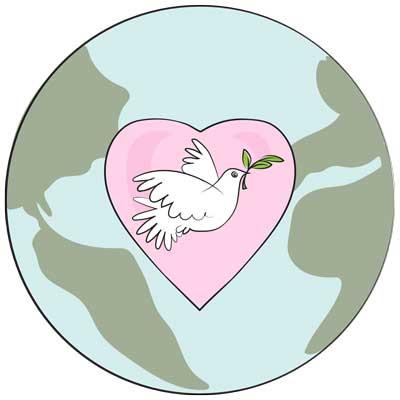Reply To:
Name - Reply Comment
Deep and lasting peace is not just the absence of war but has many virtues and values. As the famous St. Ignatius of Loyola has put it, make me a channel of peace, where there is hatred let me bring love, where there is injury, pardon and where there is doubt true faith in noble human values; make me a channel of peace, where there is despair in life, let me bring hope, where there is darkness only light, and where there’s sadness ever joy; grant that I may never seek, so much to be consoled as to console, to be understood as to understand, to be loved as to love with all my soul; make me a channel of peace, it is in pardoning that we are pardoned, it is in giving to all people that we receive, and in dying to selfishness that we are born to eternal life.
 On September 21, the United Nations celebrates the International Day of Peace with the theme being “Recovering better for an equitable and sustainable world.” In a statement, the UN says the UN General Assembly has declared this as a day devoted to strengthening the ideals of peace, through observing 24 hours of non-violence and cease-fire. This as we heal from the COVID-19 pandemic, we are inspired to think creatively and collectively about how to help everyone recover better, how to build resilience, and how to transform our world into one that is more equal, more just, equitable, inclusive, sustainable, and healthier.
On September 21, the United Nations celebrates the International Day of Peace with the theme being “Recovering better for an equitable and sustainable world.” In a statement, the UN says the UN General Assembly has declared this as a day devoted to strengthening the ideals of peace, through observing 24 hours of non-violence and cease-fire. This as we heal from the COVID-19 pandemic, we are inspired to think creatively and collectively about how to help everyone recover better, how to build resilience, and how to transform our world into one that is more equal, more just, equitable, inclusive, sustainable, and healthier.
According to the UN the COVID-19 pandemic is known for hitting the underprivileged and marginalized groups the hardest. By April 2021, more than 687 million COVID-19 vaccine doses have been administered globally, but more than100 countries have not received a single dose. People caught in conflict are especially vulnerable in terms of lack of access to healthcare. In line with the Secretary-General Antonio Guterres’ appeal for a global ceasefire last March, in February 2021, the Security Council unanimously passed a resolution calling for Member States to support a sustained humanitarian pause to local conflicts. The global ceasefire must continue to be honoured, to ensure people caught in conflict have access to lifesaving vaccinations and treatments.The pandemic has been accompanied by a surge in stigma, discrimination and hatred, which only cost more lives instead of saving them: the virus attacks all without caring about where we are from or what we believe in. Confronting this common enemy of humankind, we must be reminded that we are not each other’s enemy. To be able to recover from the devastation of the pandemic, we must make peace with one another. We also need to make peace with nature.
The UN says that despite the travel restrictions and economic shutdowns, climate change is not on pause. What we need is a green and sustainable global economy that produces jobs, reduces emissions, and builds resilience to climate impacts. The UN has invited all countries and people you to join the efforts of the UN family as we focus on recovering better for a more equitable and peaceful world. We need to celebrate peace by standing up against acts of hate online and offline, and by spreading compassion, kindness, and hope in the face of the pandemic, and as we recover.
This is a global health crisis unlike any other — one that is spreading human suffering, destabilising the global economy and upending the lives of billions of people around the globe. Vulnerable populations in countries with weaker health systems, facing existing humanitarian crises are at great risk. The UN says we need to make commitment to ensure all people have access to all the tools to defeat COVID-19. Global solidarity is not only a moral imperative, it is in everyone’s interests.
As Dalai Lama has said, we can never obtain peace in the outer world until we make peace with ourselves. We need to add that as world governments commit themselves to the peaceful resolution of conflicts instead of resorting to war and creating multi-billion dollar arms empires. Lasting peace needs to begin in our homes which need to be seen as temples and holy places. At home we need to be sincere, selfless, sacrificial and committed to serving each other and making them happy. Small words will help build up domestic peace. We need to learn to use words such as ‘please’, ‘thank you’ and ‘sorry’ more often at home.